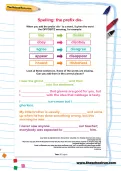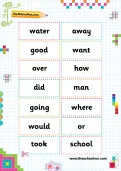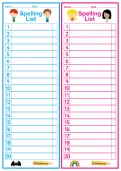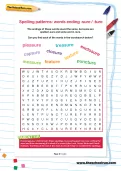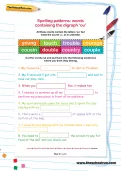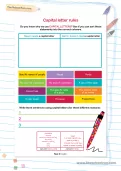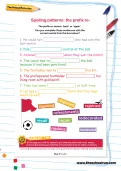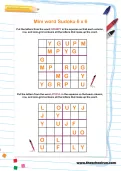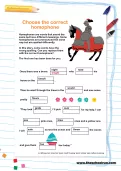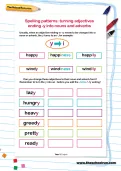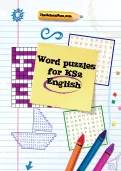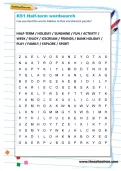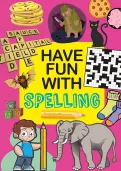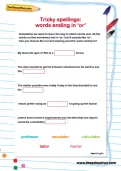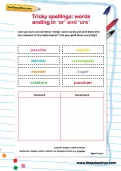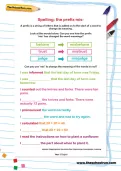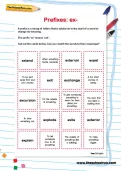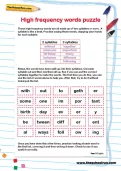The endings of these words sound the same, but some are spelled -sure and some end in -ture. Can you find each of the words in the wordsearch below?
or
Register to add to your saved resources
Already a subscriber? to view this content.
All these words contain the letters ‘ou’ but make the sound /u/, as in umbrella. Cut the words out and put them into the following sentences where you think they belong.
or
Register to add to your saved resources
Already a subscriber? to view this content.
Do you know why we use capital letters? See if you can sort these statements into the correct columns.
or
Register to add to your saved resources
Already a subscriber? to view this content.
The prefix re- means ‘back’ or ‘again’. Can you complete these sentences with the correct words from the box?
or
Register to add to your saved resources
Already a subscriber? to view this content.
Put the letters from the word GRUMPY in the squares so that each column, row, and mini-grid contains all the letters that make up the word.
or
Register to add to your saved resources
Can you rearrange these letters to find the word solution to each clue?
or
Register to add to your saved resources
Already a subscriber? to view this content.
Homophones are words that sound the same but have different meanings. Some homophones are pronounced the same way but are spelled differently. In this story, some words have the
wrong spelling. Can you replace them with the correct homophone?
or
Register to add to your saved resources
Already a subscriber? to view this content.
Usually, when an adjective ending in –y needs to be changed into a noun or adverb, the y turns to an i. Can you change these adjectives to their noun and adverb form? Remember to turn the y into an i before you add the -ness / -ly ending!
or
Register to add to your saved resources
Already a subscriber? to view this content.
A KS2 literacy worksheet created by an experienced teacher to practise adding the prefix dis- to a word. Discover prefix definitions, examples of the prefix dis– and how prefixes are taught in primary school.
or
Register to add to your saved resources
Are you and your child tired of the same old English revision and practice sessions? Try something completely new and give them these fun English word puzzles instead! They'll review everything from connectives to apostrophes, using what they learn in class to solve codes, crosswords and wordsearches.
or
Register to add to your saved resources
Already a subscriber? to view this content.
Help your child get to grips with syllables by dividing the words on this worksheet into two syllables.
or
Register to add to your saved resources
Already a subscriber? to view this content.
Use this wordsearch during half-term to help your child with vocabulary and spelling while recognising words that are all about having fun!
or
Register to add to your saved resources
Does your child’s spelling really let their writing down? Have fun with spelling offers you practical and effective strategies to help support your child’s learning at home, based on a real understanding of how spelling is taught and why it’s tricky to master. The bad news? Your child will be beating you at Scrabble before you know it!
or
Register to add to your saved resources
Already a subscriber? to view this content.
This worksheet lists words ending in ‘or’ that, when spoken, make the ‘er’ sound. Children need to choose the correct word to complete the sentence.
or
Register to add to your saved resources
Already a subscriber? to view this content.
This worksheet lists words that end ‘ar’ or ‘ure’. Children need to cut them up and then arrange them into the ‘correct’ or ‘incorrect’ boxes.
or
Register to add to your saved resources
Already a subscriber? to view this content.
This worksheet demonstrates to children how the prefix mis- changes the meaning of a word. They are then encouraged to use words starting mis- in sentences.
or
Register to add to your saved resources
Already a subscriber? to view this content.
Use this worksheet to familiarise your child with words starting with the prefix 'ex'. It provides them with an activity where they need to match the word with the meaning.
or
Register to add to your saved resources
Already a subscriber? to view this content.
Use this to help your child with their spellings and knowledge of syllables. They need to cut out all the syllables and then see how quickly they can put them back together as words.
or
Register to add to your saved resources
Already a subscriber? to view this content.
After learning to read and spell the most common words in Reception and KS1, your child will move on to a longer list of common words including 'brought' and 'thought'. Support their learning at home with our KS2 high frequency words practice flashcards.
or
Register to add to your saved resources
